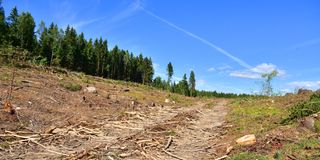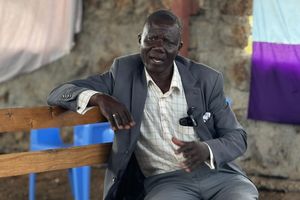Climate change and deforestation disrupting lives in Homa Bay County

Crop failures are becoming more frequent as farmers struggle to time their cultivation.
What you need to know:
- Crop failures are becoming more frequent as farmers struggle to time their cultivation.
- During dry periods, the grass withers, animals grow thin, and residents are forced to rely on government assistance for relief food.
A satellite search for Lambwe Valley in Homa Bay County reveals stunning images of a vibrant ecosystem teeming with diverse plant and animal life.
Some of these images showcase wildlife in Ruma National Park, while others depict lush landscapes, rolling hills, and expansive tree-filled valleys, painting a picture of a serene place blessed with ample rainfall and abundant food resources.
However, many of these images were captured years ago and may not accurately reflect the current situation. In reality, Lambwe Valley has become a challenging environment, especially during certain months of the year.
Unpredictable weather patterns have made life increasingly difficult for residents. Unlike in the past, when rain patterns were reliable, climate change has brought erratic weather, disrupting the agricultural rhythm that sustains the local economy.
Maxwell Ochoo, a resident of the area, says the increasingly unpredictable climate has made farming—Lambwe Valley’s primary economic activity—a gamble. "We’ve had several seasons where crops failed after planting because no one knows when the rains will come," he says.
Crop failures are becoming more frequent as farmers struggle to time their cultivation. During dry periods, the grass withers, animals grow thin, and residents are forced to rely on government assistance for relief food. Even wildlife in Ruma National Park suffers from drought, which threatens the entire ecosystem.
Joseph Gathua, a Natural Resource Management Scientist with the Ministry of Wildlife, emphasises the toll climate change is taking on wildlife. “Drought is a major threat to wildlife in Ruma and other parks across the country,” he notes.
These droughts are often followed by periods of heavy rainfall, leading to flash floods that damage property and disrupt livelihoods. "No one in Lambwe is prepared for either extreme—whether it’s water scarcity or excess rain that causes floods and crop loss," Ochoo explains.
The region’s challenges are compounded by deforestation. Lambwe Forest, one of Homa Bay’s key water catchment areas, is under threat from illegal logging and charcoal production. According to Ochoo, despite local efforts to plant tree seedlings, deforestation persists due to insufficient intervention from authorities.
"Lambwe Forest has one of the highest rates of deforestation in Homa Bay, and officials from the Kenya Forest Service (KFS) are doing little to save it," Ochoo laments. Cases of forest fires have also been reported, further complicating efforts to protect the forest.
Sharon Cheluget, Homa Bay County Forest Conservator, says residents need to plant at least 15 million trees annually to enhance forest cover and combat environmental degradation. "We are patrolling water catchment areas to deter illegal logging, and we’ve arrested several individuals involved," she says.
The effects of deforestation extend beyond Lambwe Valley, impacting crop yields and contributing to food scarcity throughout Homa Bay County. Farmers report stunted crops, a clear sign of growing food insecurity.
The challenges this place faces are a microcosm of the broader global climate crisis. A recent report revealed that 2023 recorded the highest temperatures since 1850, reaching 1.18°C above the 20th-century average.
Climatologist Clifford Omondi warns that climate change will continue to intensify, leading to biodiversity loss, pollution, and global instability. "Thousands of tree species are facing extinction, and over two billion people are at risk," he says.
Omondi points out that Africa, while contributing the least to global carbon emissions, bears the brunt of climate change’s adverse effects. In particular, rising temperatures exacerbate human-wildlife conflict as herbivores leave parks in search of food.
"Climate change can lead to conflicts over resources, displacement, and increased risks to human life," Omondi explains. He calls for a collective effort to reverse the climate crisis through conservation and sustainable practices.
Some of these issues will be discussed at the United Nations Climate Change Conference (COP29) in Azerbaijan in November. Omondi urges global leaders to implement past climate agreements, including the Montreal, Paris, Rio, and Kyoto protocols.
In Kenya, the demand for land for farming and settlement is driving deforestation, even in private forests. Experts like Lovina Onyango from Consumer Unity & Trust Society (CUTS) International argue that educating farmers on agroforestry practices is essential to mitigating these effects. "Farmers should integrate trees into their farms instead of clearing them entirely. Trees help prevent soil erosion and can coexist with crops," she says.





